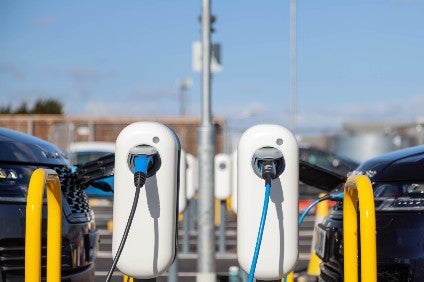
New analysis by the Society of Motor Manufacturers and Traders (SMMT) revealed the ratio of vehicle charge points to plug in cars deteriorated by 31% during 2020.
The research showed, at the end of 2019, 11 plug in vehicles potentially shared a standard public chargepoint capable of charging both battery electric (BEVs) and plug-in hybrid vehicles (PHEVs). In contrast, at the end of 2020, the ratio had fallen to one charger for every 16 plug ins.

Discover B2B Marketing That Performs
Combine business intelligence and editorial excellence to reach engaged professionals across 36 leading media platforms.
While most people currently purchasing an electric vehicle are likely to be able to plug in at home, on a driveway or designated parking bay, achieving net zero requires all drivers to make the switch, including those who depend on street parking.
Plug in vehicles continue to grow in popularity, accounting for around one in every six new cars registered in 2021. The public charging infrastructure required to keep them moving, however, must keep pace with the accelerating vehicle uptake, but the numbers reveal that public charge point rollout is lagging behind.
Britain’s ratio of plug-in vehicles on the road to standard public chargers has deteriorated to become one of the worst among the top 10 global electric vehicle markets at 16:1 in 2020. South Korea (3:1), the Netherlands (5:1), China (9:1), France (10:1), Belgium and Japan (both 13:1) all offer their EV drivers better coverage, although the UK does marginally outperform Germany (17:1).
However, with 4,109 new standard public charge points installed between January and September 2021, compared with 212,181 new plug in car registrations, just one new standard charger is being installed for every 52 new electric cars, a rate insufficient to improve the user experience.
There are also significant regional disparities in the current provision of standard public charging points. London has the best ratio of cars to chargers at 10:1 although this fell from 5:1 in 2019. The east of England has the lowest availability with just one standard public charger for every 49 plug in vehicles.
Meanwhile, Wales beats the national average with a ratio of 12:1 while Scotland weighs in at 17:1.
The SMMT acknowledged that investments were being made in public charging with the government rapid charging fund allocating GBP950m to rapid and ultra rapid charge points, GB620m for zero emission vehicle grants and infrastructure announced in the net zero strategy, and a commitment all new build homes would include an electric vehicle charging point.
“This is insufficient, however, to keep up with consumer demand and targets for accelerated market transition, while increased new home charger provision will not provide any incentive for the millions of existing households that do not have a driveway or designated parking,” the lobby group said.
“As a result, SMMT is calling on government to take regulatory action to boost public charge point provision, with binding targets for delivery, commensurate with the targets for vehicle manufacturers to deliver products, to ensure installation rates accelerate.”
Mike Hawes, SMMT chief executive, said, “Appetite for electric vehicles has never been higher, but making Britain a net zero nation means convincing everyone, wherever they live, that an electric car can meet their needs. Those who can’t have their own home charge point need the confidence that they can still charge as conveniently as they can refuel. A deteriorating ratio of public charge points to cars will drain that confidence.
“Recent government funding for infrastructure was welcome but more private sector investment in public charge points is needed across the country. The UK therefore needs a framework of regulation that makes it easier to fund, build and operate electric vehicle charging infrastructure. Consequently we need commensurate and binding targets for charge point rollout and reliability so that all those without a driveway or designated parking can be confident of finding a convenient charger, and one that works.
“Decarbonising road transport is essential if we are to address climate change but it needs a framework that compels all sectors to match the investment already being made by automotive to help consumers decarbonise their lives.”






